PROFILE: Fight or flight: Chris Stricklin uses plane crash survival to propel new outlook on life
Published 5:02 pm Wednesday, March 8, 2023
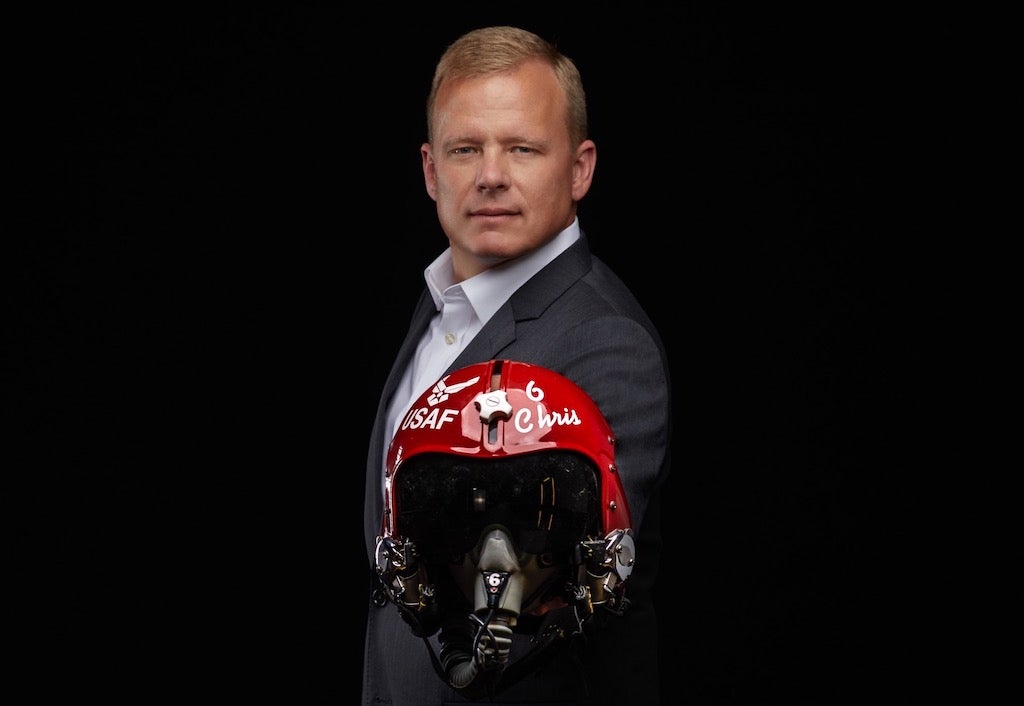
- Chris Stricklin narrowly survived a plane crash during an air show and now uses that to inspire others as an author, employee and motivational speaker.
|
Getting your Trinity Audio player ready...
|
Written by Alec Etheredge
Waking up on the morning of Sept. 14, 2003 in Mountain Home, Idaho, an uneasy feeling weighed heavily on him as everything that could go wrong was going wrong.
At that point in time, Chris Stricklin didn’t know that a few hours later, he was going to be faced with an “unsurvivable moment” during a Thunderbirds air show.
A traumatic moment that has haunted him since, Chris was forced to eject from his Thunderbird jet less than a second before it hit the ground and became engulfed in flames.It was 25.25 seconds of terror for Chris, but it was a moment in time that shaped the rest of his life.
Flashing before his eyes
With his plane 40 feet above ground and impact imminent, Chris knew an ejection at that height would likely kill him, leading to the decision not to pull the handle as adrenaline poured through his veins.
“I thought about ejecting three different times, and the last time I thought about it, my right hand, which I considered my fighter pilot hand, said no,” he said. “I knew the aircraft was going to hit the ground, and I knew I had to try to eject. I knew I was outside the envelope, I knew by the books it was unsurvivable, but when I thought about ejecting, my fighter pilot hand said no, you put the aircraft here. You’re going to take it back or not go back.”
At that moment, a second away from barreling into the ground beneath him, smoke filled the cockpit and the canopy started blowing off.
“I thought, ‘Huh, why would that happen?’ Well, it would only happen if I jettison the canopy, which I looked down at the handle, and I didn’t, or if I ejected, which I just decided not to,” Chris said. “But when I look down, my left hand has pulled the handle.”
Subconsciously, with the thought of leaving behind his family, his left hand pulled the ejection handle a half second before the plane hit the ground and burst into flames as pieces of the aircraft flew in multiple directions.
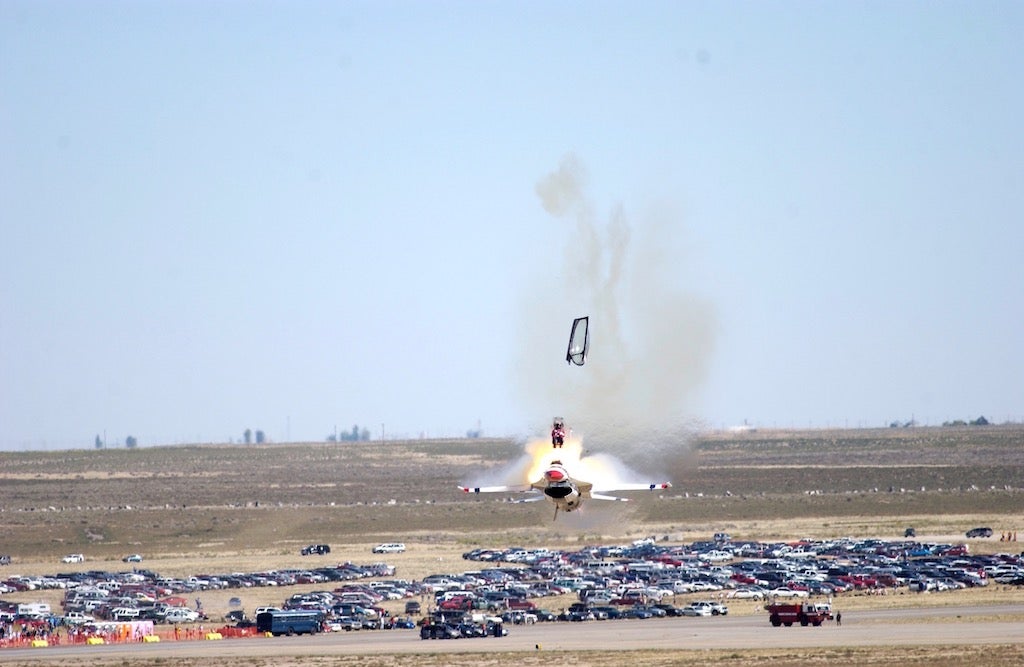
“If you think training doesn’t work, I consciously decided not to eject the aircraft, but my body, the military training it had been through, knew it was the last second I could possibly have the chance of survival and my hand just pulled the handle,” he said. “I left the aircraft 40 feet above the ground, a half second before impact. What was that like? You can imagine how fast that worked.”
Years later, he still recalls all of the signs leading up to the terrifying moment.
Chris said they didn’t have enough gas to practice the show when they got there, points were moved, the helicopter flight didn’t work and satellite imagery wasn’t working properly.
“If it could go wrong, it did,” he said. “The day of the show, I called Terri and asked if everything was OK with the kids, I went to my safety observer and said, ‘something doesn’t feel right, I don’t want to do my take off maneuver.’ Being my boss, he told me to do it, so we went out to fly.”
Chris was the last aircraft to take off that day, and 25.25 seconds later, he was in the air facing survival.
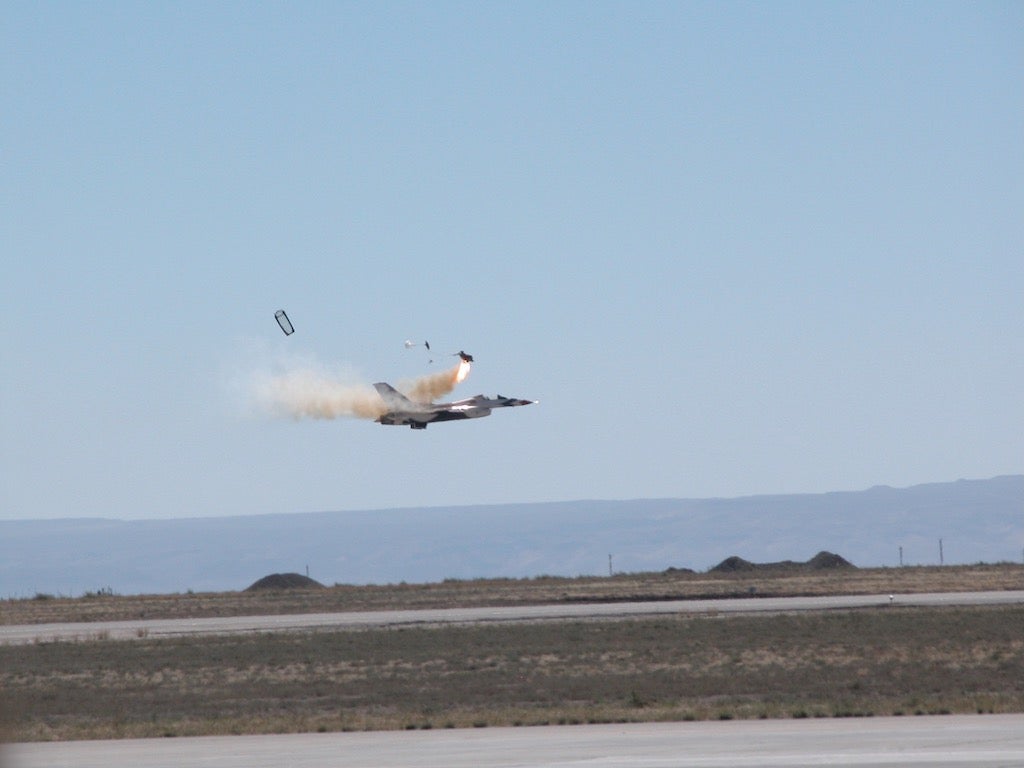
Surviving the unsurvivable
As his seat lifted from the cockpit and threw him from the Thunderbird hurling toward earth, Chris was 40 feet above the ground with little time to prepare for the impact he was about to face.
“You usually get about three swings into the parachute and then it will dampen out and you start parachuting down,” he said.
For Chris, however, the chute opened, halted his forward momentum and when he swung down for the first time, he hit the ground with full force.
“I was so low, that when I swung down, I got no swings in the parachute, I just hit the ground,” he recalled.
Laying in the fireball, Chris was in a state of shock. The smoke and heat billowing from the aircraft was undetectable to him in the moment.
Conscious in the moment, he remarkably stood up and started walking to his safety observer close about a half mile away.
“On the third step, training kicked in and told me I was in shock,” he said. “I backtracked my steps and laid down and waited on the fire chief to come get me. Now, we know, if I would have kept walking, I would have walked through the hottest part of the fire.”
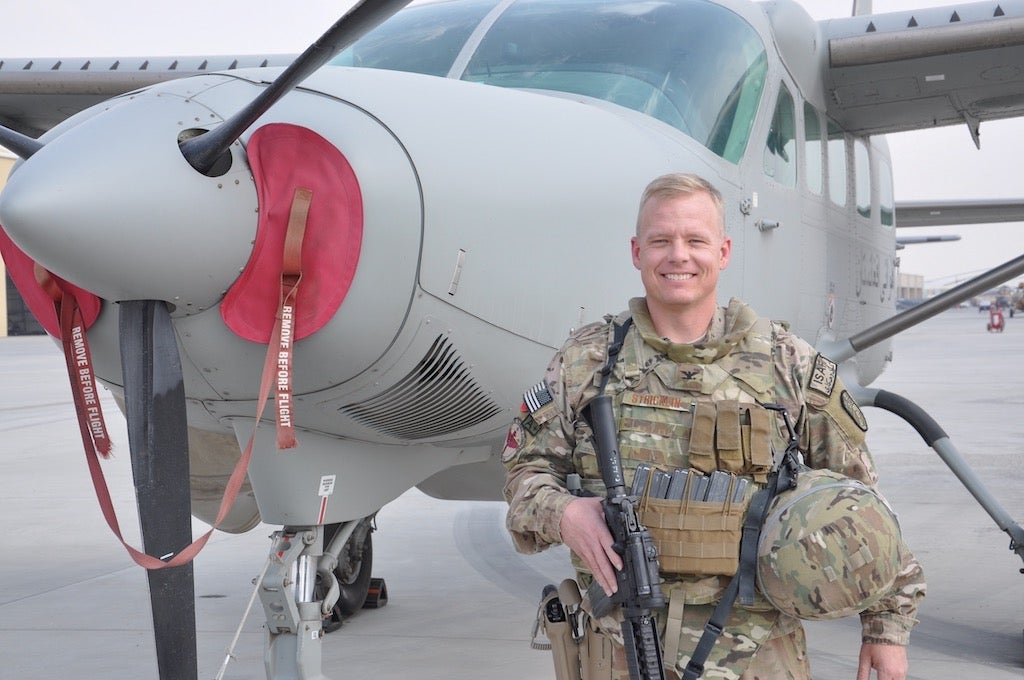
missing
Laying there, the responders got the fire under control enough that they could get to him.
When the fire chief came running up, Chris told him, ‘Man, am I glad to see you,’ to which the chief responded, ‘Not as glad as I am to see you.’
He was then loaded on to a backboard and taken to the hospital.
“Everything was going as smooth as trauma can,” he said. “That’s when they started spinning up the helicopter to take me to a higher level trauma center. They all walk out of the room and told me it would be 30 seconds before everything was ready to take me to the helicopter.”
Then, alarms started going off on the equipment attached to Chris, while the heart monitor was beeping at an intense rate.
“What happened?” the doctors said coming back in.
“I just realized I ejected from an aircraft,” Chris responded.
“My adrenaline had worn off,” he said. “I don’t know how long it was from the crash to that point, but to that moment, it was the calmest I ever was in my life until the adrenaline wore off.”
This was also around the time officials decided to reach out to let Chris’ wife Terri know about the accident, but miscommunication devastated her at first.
“She didn’t hear what was said,” Chris said. “She heard that I didn’t make it. Just to make it more traumatic for her, she thought I didn’t survive.”
It was a moment of shock for Terri.
“I talked to him at lunch time before he took off,” she said. “The next call was telling me there has been an accident. I thought a car accident at first, they said ‘No, he ejected and we don’t know if he’s OK.”
Normally attending the air shows with him, this time, Terri and the kids decided to stay home because of the show being in two different places in back-to-back days.
Thankful she and the kids weren’t there to witness the incident, she had a friend come to get the kids and take them to McDonalds while she tried to keep her composure.
“I didn’t get many updates after hearing he was taken to the trauma center, but finally, he called and said he was OK,” Terri said. “I flew up the next day and saw him to know he was OK. They put him through every test in the world, but he only had one scratch on his chin and left side of face was swollen.”
At first, they thought a lot of things were wrong with Chris, but after eight hours strapped to a backboard and hearing negative thoughts, the doctor came in with miraculous news.
“I can’t believe I’m saying this, but I’m going to unstrap you, be careful, you’re going to walk out of here,” the doctor said.
At approximately 1 a.m., they helped him off of the backboard he had been on all day, and he walked out of the hospital.
The only injuries were minimal. He had a scratch and his face was slightly swollen, while he will have some back problems and he is 2.5 inches shorter than he was before the crash.
“I was amazed,” Terri said. “I went from thinking he was dead one day to being amazed he was in as good of shape as he was the next day. It was a miracle, and I truly 100 percent believe God was watching over him that day. I was so thankful for that.”
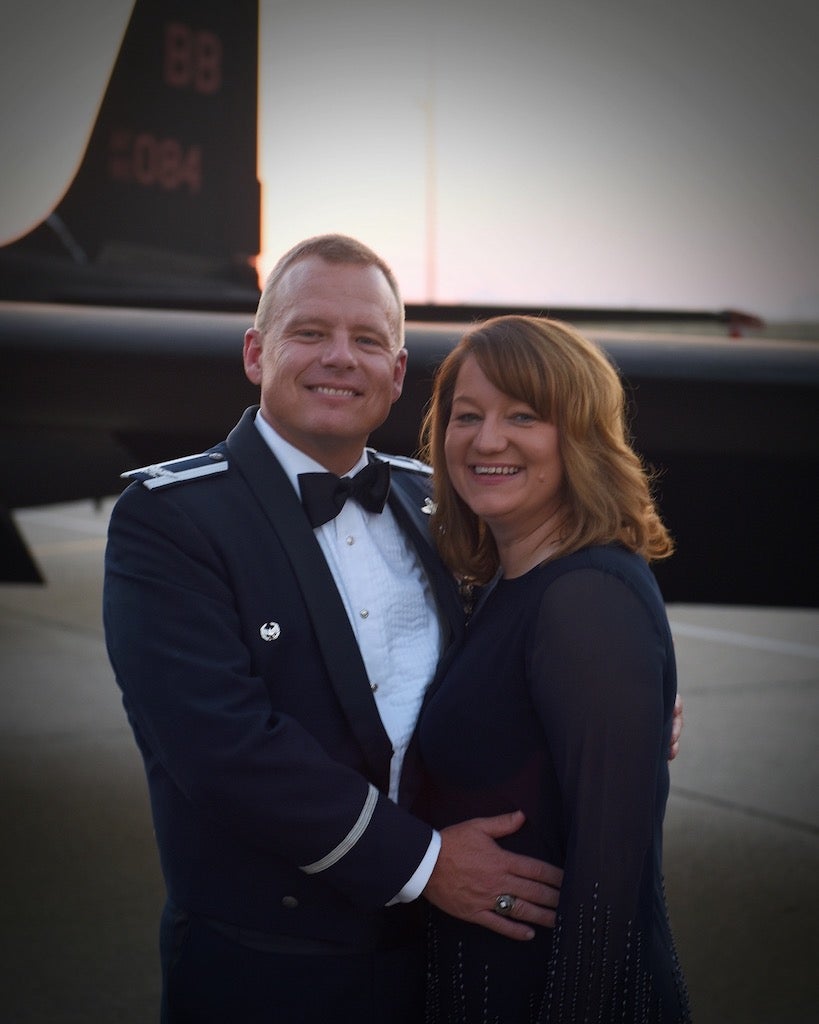
Learning to cope
The trauma of the moment was something Chris and Terri brushed aside, moving on with their lives without mentioning it despite the struggles that followed over the next several years.
Directly after, Chris got his dream assignment to go fly F-15s in Japan.
“That day, I got a call from a mentor of mine,” Chris recalled. “He said, ‘I think your family needs a break. I said, ‘No. My wife loves me flying. She loves for me to go to another flying assignment.’ He told me, it was 11 a.m. on a weekday morning, he said, ‘Go take Terri to lunch and ask her that question. If she says she wants you to go back to flying right now, then your off. You’re on your dream assignment. If not, I will get you in a non-flying assignment so your family can take a breath.”
Chris did exactly as his mentor requested.
“She said, ‘Heck no I don’t want you to go fly, I need a break. I need a break form you putting on the G suit and climbing into a jet,’” Chris said.
Chris said for a long time, that’s all they ever talked about it.
They moved on for a while with him working at the Pentagon and White House before he returned to flying.
“We never talked about the ejection and the impact it had on our family, and you know there was,” he said.
That changed on his last assignment as anxiety weighed him down climbing into an ejection seat.
After 20 years in the Air Force and living all over the world, he decided he didn’t want to do it anymore and retired.
“At that point, how do you deal with something you haven’t talked about in 15 years? Well, apparently the answer is write a book, publish it internationally and go on a speaking tour,” Chris said with a laugh.
That forced the two of them to start talking about it and dealing with it.
“We didn’t talk about it for a while,” Terri said. “We wanted to forget about it and move on. He thought I was fine, I thought he was fine. He met with his doctor and he told his doctor he was struggling. The doctor asked if he talked with me, and he said no. The doctor suggested he do so. I think it was healing to say, ‘Oh my gosh, that was horrible; you almost died.’ I didn’t realize how much he was struggling, so it has been super great for us to talk about it.”
At that point, the couple, who started dating at 15 years old while at Shelby County High School, decided to make a move they never thought they would—back home.
With the comfort of opening up, Chris turned his near-death experience into an opportunity to inspire others to embrace life and live intentionally. He has now written two inspiring books titled Survivor’s Obligation and Aiming Higher.
Both books revolve around leadership qualities and living your life with purpose and feature co-authors with military backgrounds who joined forces to write the book with a goal of making a difference.
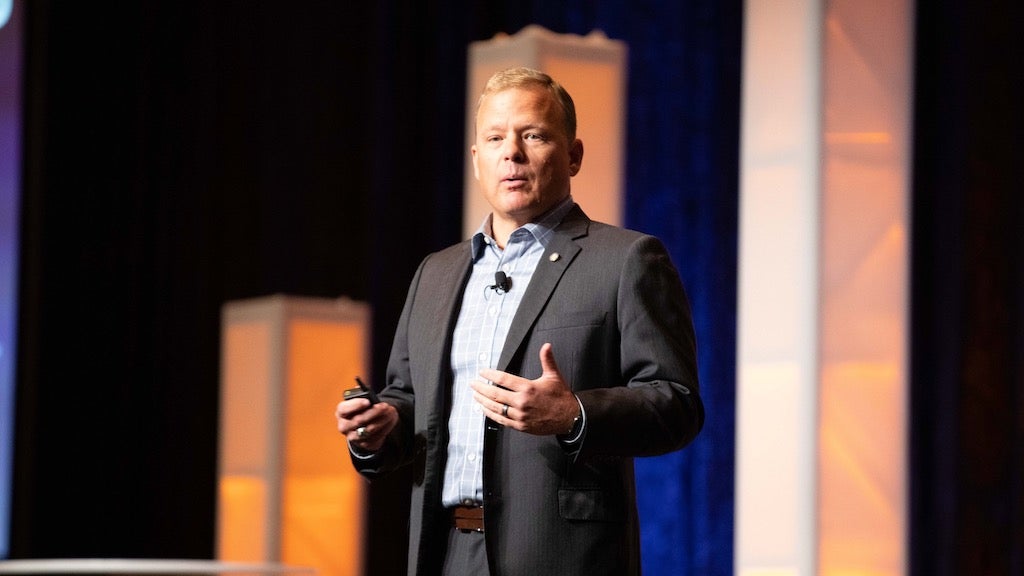
Living life intentionally
Stepping off stage at a recent speaking engagement in Indianapolis, Chris was approached by an older woman who stopped him and said, “My ex-husband has post-traumatic stress.”
“That is why I tell my story, opening a conversation about trauma and the after effects,” Chris said. “The cool story and videos get you to listen, but it’s the message I hope you take away. Every time I come down off stage, there is always someone who will tell me, ‘I’ve never told anybody, but…’. It all has to do with your life and how you can better embrace your life and learn from the things going on your life to live intentionally in every part of your life.”
He has also taken that same approach into the work field as the president of Dunn University, a construction company that maintains the mission of recruiting, training, developing and retaining a skilled workforce.
Chris takes the leadership tools learned in the Air Force and the lessons learned from his near-death experience and applies them to everything he does both personally and professionally.
Whether that is getting the most out of a trip to Disney World with his family, adopting two of his four kids after the accident, implementing new practices within the work force to make this area the best in the country or joining statewide committees at the request of the governor.
It is a quality Terri has seen in her husband since very shortly after the accident and one the family has adopted with ease.
“We don’t want to put things off. If you want to take trips, take them. If you want to get the new thing, get it. Life’s short, if you get the chance to do it, do it,” she said. “Six months after, we went to China and adopted our daughter, then, a few years back, we went back and adopted our son. Those were the two biggest things for us.”
Adopting their two kids was something the couple had talked about for years but kept putting off. Then, they turned to living intentionally and made it happen.
“He doesn’t stop. I have to convince him to sit down and have a cup of coffee,” Terri said. “I’ve worked it into our routine that we sit on the porch to drink a cup of coffee so he can look around the yard for what he wants to do. He always is multi-tasking and it’s quite amazing honestly. He works his job, is a dad and husband, is on several committees, a speaker, an author; yet somehow, he still makes time for all of us. He is honestly the best person I know. He is a great father. He’s a great husband. He always thinks of us above everything else.”
Chris lives with that extra gear because he doesn’t want to give anything less than his all to everything he is passionate about.
“You never know when it is going to be your last day,” Chris said. “You never know when today is going to be your last and the last interaction with your family, with your co-workers is the last time they’ll talk with you. We have to ask ourselves each and every day when you close your eyes, ‘If today was my last day on earth, would I live it the same way?’ If the answer is no, fix it tomorrow. If the answer is yes, then learn how to do it again because if you ask yourself that each and every day, one of these days, you’ll be right.”









